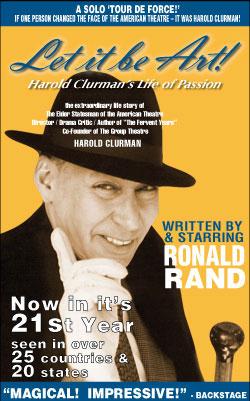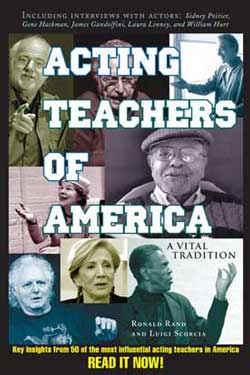Andrus Nichols
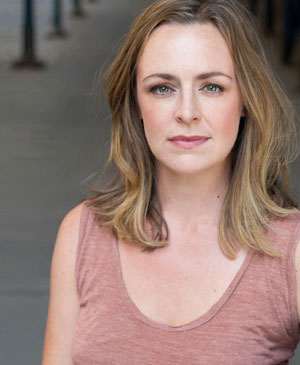 Producing Director and Co-Founder of Bedlam Theatre Company, her performances includes in “Hamlet” and “Saint Joan” at the McCarter Theatre (Lucille Lortel Award nom.), “The Seagull,” as Elinor Dashwood in “Sense & Sensibility,” “Hello From Bertha” at Pook’s Hill, “Hamlet” at Shakespeare Forum, “The Libertine” at Fools’ Theatre. She has also performed across America in “Hamlet” and “Saint Joan” (Helen Hayes Award nom.), in the title role of “Hamlet,” “Iphigenia & Other Daughters” at We Players on Alcatraz Island, “Twelfth Night,” “Julius Caesar,” “The Importance of Being Earnest,” and as Lizzie in “The Rainmaker.”
Producing Director and Co-Founder of Bedlam Theatre Company, her performances includes in “Hamlet” and “Saint Joan” at the McCarter Theatre (Lucille Lortel Award nom.), “The Seagull,” as Elinor Dashwood in “Sense & Sensibility,” “Hello From Bertha” at Pook’s Hill, “Hamlet” at Shakespeare Forum, “The Libertine” at Fools’ Theatre. She has also performed across America in “Hamlet” and “Saint Joan” (Helen Hayes Award nom.), in the title role of “Hamlet,” “Iphigenia & Other Daughters” at We Players on Alcatraz Island, “Twelfth Night,” “Julius Caesar,” “The Importance of Being Earnest,” and as Lizzie in “The Rainmaker.”
What do you love the most about being an actress?
I think the simple answer is I love to “play,“ getting to spend my days with an active imagination. Playing other lives in other circumstances than my own is fun. To play imaginative games of pretend as an adult and keeping that part of my heart and body engaged, works for me on all levels. I can’t imagine what else I would do.
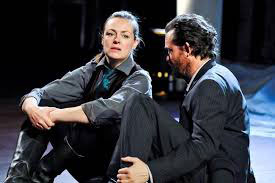 “Saint Joan” (Bedlam production) photo by Jenny Andersen
“Saint Joan” (Bedlam production) photo by Jenny Andersen
I understand acting chose you at a very young age, and you also had to deal with stage fright which took you in a different direction.
When I was a little kid I wanted to be an actor. I had a wonderful grandmother who took me to see a ton of theater. When I was fourteen, I became terrified with an overwhelming stage fright. I was brought to a boarding school with over a thousand kids and I didn’t know anyone and become very self-conscious. I ended up quitting acting. Looking back I realized it was adolescence.
By the time I was in my late 20’s, unintentionally, I was doing other things. I got married, lived up in Connecticut, ran a wine and spirit shop. I rode horses professionally, I studied and got two degrees, and later also got my Masters. One of the degrees had been in social behavior, which helped me in terms of learning so much more about the world outside of theater and ended up helping me when I came to acting. I had always been interested in the psychology of marriage, and the lives and the stories people go through.
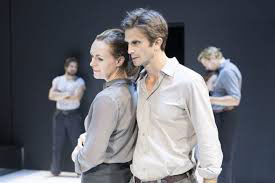 Arthur Miller’s “A View from the Bridge” (Center Theatre Group production) photo by Jan Versweyvald
Arthur Miller’s “A View from the Bridge” (Center Theatre Group production) photo by Jan Versweyvald
Well, someone suggested I go and audition for the ensemble for a community theater production of “The Pajama Game.” Actually, I thought it might be fun, so I did. Now I had no fear at all like when I was younger. I was around twenty-eight now, and it all just took off. I ended up doing a ton of community theater over two years - musicals, plays, children’s theater.
Then something happened when I played Lizzie in “The Rainmaker.” Working on that play, I began to think, “This is no longer a hobby, I can do this.” So I began to figure out how to chase this “dream.”
I ended up to going to Shakespeare & Company in Lennox, Massachusetts, did some weekend intensives, month-long workshops, and luckily for me, I did it exactly at the right time. I met Eric Tucker and Tom O’Keefe in one of those workshops.
I knew I also had to get my technical skills to a higher level. I first studied in San Francisco and ultimately came to New York City. I spent two years in classes, figuring things out. I decided to produce a play I could act in, and hired Eric to direct the show. He suggested we create our own company together, and that’s how Bedlam came to be. It all happened quickly.
How would you describe your affinity for plays with heightened language?
 “Jane Austen's Sense & Sensibility” (Bedlam production) photo by Elizabeth Nichols
“Jane Austen's Sense & Sensibility” (Bedlam production) photo by Elizabeth Nichols
I feel lucky that I was really wasn’t afraid of language in high school; I liked dense texts. I would get great joy from the sound of words. It feels like a treat to work on plays like Shakespeare, where the language is really rich and imaginative. To use language to reveal very simple truths about human beings.
At the time you and Eric Tucker founded Bedlam in 2012, were you thinking about the idea of presenting classical plays in repertory?
Yes. When Eric approached me he knew he wanted me to play “Saint Joan,” and to do the show with four actors, and do “Hamlet, with the same four actors in repertory. Now in New York, there are hundreds of theatre companies trying to figure out what to do to get noticed. So we felt with our skill sets, this would be the best way help get noticed and be able to launch something which would turn into a institution. We weren't interested in just producing one play and not get any traction a year later. We wanted to create a momentum.
With “St. Joan,” I really hadn’t read the play before and when I did, I had a moment of feeling sad. I thought: “What am I going to play in this? The duchess?” Then Eric said: “You'll play Joan.” I told him, “Let me re-read it.” When I did I thought I have absolutely no idea how to play a seventeen-year-old milkmaid. Of course, we’ve now performed the play over four hundred times!
What did you discover about yourself as you opened yourself up more and more to find out she was, as you created a theater company?
I was discovering actually it was great way to launch a theatre company at the same I was working on Joan. We knew the budget would rapidly increase according to our three year plan so we put ourselves under that kind of pressure in order to build an institution. It was especially challenging to do it in a city like New York City. I was really determined to make it work and once you throw all your faith at it, things happen quickly.
I wasn’t someone who grew up in a church with organized religion, and Joan is a total zealot. I began to learn what that was like - to believe and trust “the ground will appear.” Learning to play her was a great lesson for my own life. What it was like to make something work, to trust your gut, to leap against the odds.
One of the things you find in the play is how simple faith is depicted by Shaw. In a way, it’s not nearly as complicated as I thought it would be. She just knows what she's supposed to do, she believes she's on a divine mission for France and just moves forward. There’s something so beautiful about the simplicity in the way Shaw write the play. It makes complete sense and I thought it was about this complicated icon. I found a simple story about faith and passion and good ideas, and what happens when you let that faith pull through in a complicated situation.
How does being such a proficient rider contribute to your acting skills?
Riding, specifically, has helped me. Ultimately once I began to relax as an actor, it became very much like riding. Riding is all about listening with your whole body to the horse. You’re very aware of what you're communicating, with every part of your body. The horse can feel everything, your lower back, how you place your hands, the inside of your leg, everything. It’s a great lesson in physicality, listening with all parts of your self. I’m not sure I integrate it all the time in my work, but I would love to, with the same physicality.
From an actresses’ point of view, how would describe Eric Tucker’s approach in working with actors bringing these classics to life?
I think certainly with “St. Joan” and “Hamlet,” we spent a full four weeks looking at every word, every thought in the text to make sure we all really understood all of the thoughts in the air and what stories we were telling. We treated it as a new play, it was about what story we wanted to tell.
Taking the text to the stage Eric is very playful in the rehearsal process, he’s very open to other actor’s ideas. How to switch characters, how to approach scenes to try his idea or someone else’s. He doesn’t get attached to one way of doing something, he’s always invested in finding a better way to do it. In the Bedlam process, we’re investigating everything before we open, and it continues during previews and even after we open. If a better idea comes up, that could be a better way.
We attract actors who are willing to work with us in this way, who want to keep the piece alive and fresh in the most simple ways. Sometimes we’ll talk out another way of trying out a moment before a performance, and then go out on stage without a rehearsal and see what happens.
How do you “marry” yourself to the language in plays like “Hamlet” and doing Shaw’s work?
The language, the ideas are enormous, and you can’t dumb it down. You use the language to get at the size of the thought, then something really magical can happen. Shakespeare is unlike any other playwright I can think of. To have ideas that articulate the human experience in such a huge way, you have to be specific to hold the ideas. Everyone in our casts love language, so we all move towards trying to understand what the play is saying every moment. It’s an incredible treat to work with everyone in the Company, who are always looking for greater specificity.
One of Bedlam’s shows is “Cry Havoc.” written and performed by Stephan Wolfert
I’ve seen it a couple of times in its early incarnations. Stephan’s one man is an incredible story of his own experiences in the military, and then leaving it and dealing PSAT. He does it through Shakespeare’s text and his experiences. He’s also the Director of Outreach and holds two weekly free acting classes for veterans and one for female vets. Many of them have never uttered a word of Shakespeare and they’re drawn to the size of the text and the language. Stephen also articulates how some of the ideas Shakespeare has written about in his text is clearly related to PSAT. Lady Percy has a whole speech to Hotspur which describes how he’s been shouting and affected by war. Stephen has created that space so the vets can come and speak about their experiences, and through the piece, it’s become a mouthpiece for the veteran’s experience.
Acting takes us to a lot of places emotionally, but we always have to come back to ourselves and in a way, “recharge our batteries.” What do you do to keep yourself centered for the work?
Literately, I’ve been lucky. I feel through the material I’ve been approaching, I’m actually more invigorated, more alive, and feel even more like myself at the end of performing in the plays, which is wonderful.
When I’m not on stage, I enjoy watching movies, reading, watching documentaries, letting myself be an audience. Especially when I’m doing “Hamlet” and “St. Joan” in repertory, it’s important to me to get home and let there be a different narrative in my head. I might watch a British series on television, and not necessarily end up dreaming about my work. To see something else that will different completely allow me to be in the mode of receiving and processing someone else’s work.
Watching you as Elinor Dashwood in “Sense & Sensibility,” it was unforgettable how everyone in the cast created the world before us, playing different roles and you allowed us a way into to feel what Elinor Dashwood was going through. What did you love the most doing the show and bringing her to life every night?
 Andrus Nichols in “Jane Austen's Sense and Sensibility” (Bedlam production) photo by Ashley Garrett
Andrus Nichols in “Jane Austen's Sense and Sensibility” (Bedlam production) photo by Ashley Garrett
That was a really satisfying role to play. So much of the staging of the piece was so active. I only played Elinor while a lot of the other actors went from role to role in an instant. I had to hold a lot in, I learned to develop a distinct quality of stillness in playing the role. I enjoyed being in the eye of the storm. I found a huge amount of satisfaction and growth as an actor. I was never off stage and present had to be present and say very little and still “be on and hold center.” It was it’s own lesson.•























